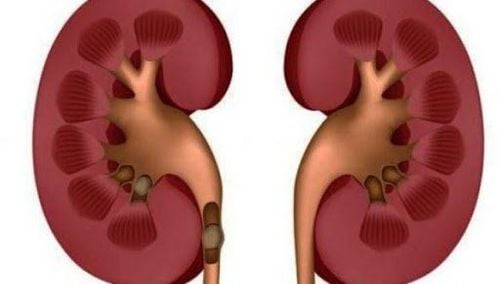This is an automatically translated article.
Metabolic disorders in the newborn can cause a high risk of death. Early detection of symptoms to have a nutritious diet for children with metabolic disorders is an important factor in saving lives and helping children develop well.
1. What is neonatal metabolic disorder?
Neonatal metabolic disorder is known as a term to describe a group of molecular genetic diseases caused by disorders of genetic structures in the body leading to various defects in function as well as structure of the body. enzymes, hormones, receptors, proteins... involved in the transport and metabolism of nutrients in the body. The formation and control of these factors are determined by inherited genes.
Metabolic disorders often develop strongly in children under 12 months of age, in some cases, after birth, occur suddenly or the disease progresses very slowly. Symptoms of the disease will vary depending on the progression of the disease.
2. Causes of metabolic disorders in children
Children with metabolic disorders is a rare but extremely dangerous disease with a very high mortality rate.
Food usually has main components such as protein, lipid, carbs... that need to be metabolized to produce energy so that the body can maintain and develop. In the process of metabolism, it is also necessary to have more enzymes, hormones, transport proteins, and cofactors to interact to help this process take place more smoothly. These nutritional components are controlled and controlled by the respective genes and also belong to the genetic factors of each individual. If due to some cause acting on the genes involved in the metabolism, causing the gene to be mutated, the corresponding enzyme will not be synthesized, leading to a disorder in the metabolism. In addition, some substances can be deficient because they are not metabolized, while others are too much in excess in the body, causing stagnation.
For children who are still in the womb, the nutrients that the child receives are all metabolized by the mother's body and transferred to the fetus, so the fetus can develop normally. However, when the baby is born, the baby's body begins to get used to metabolizing the nutrients provided by breast milk, formula or the first foods that the baby is introduced to. If the child is healthy, he can respond better to metabolizing these nutritional compounds. However, children with the disease can have trouble when the nutrients taken into the body are not metabolized and are left to cause toxicity in the body.

Trẻ bị rối loạn chuyển hóa là bệnh lý khá hiếm gặp nhưng vô cùng nguy hiểm
3. Types of metabolic disorders in children
Metabolic disorders in children can be divided into 3 main groups based on the groups of nutrients that the body has metabolic problems:
Amino acid metabolism disorders: Protein is built from basic units. includes amino acids. During digestion, proteins from food are broken down into amino acids. Amino acids from the intestines go into the blood and to the organs of the body, and these amino acids are all used to synthesize specific proteins for the body. Fatty acid metabolism disorders: This group of diseases can make it difficult for the body to convert fat into energy for the body to use to maintain the body's vital activities. Disorders of organic acid metabolism. In addition to the metabolic disorders mentioned above, there are a number of groups of metabolic disorders related to sugar, steroid, and urea metabolism. Any type of disorder poses a risk to children, especially children. I just gave birth. Because at this time, the child's health and organ systems have not developed stably. Therefore, the earlier detection of metabolic disorders in children and timely intervention helps to protect the organ functions of the child's body.
4. Nutritional treatment for children with metabolic disorders
In the case of children with congenital metabolic disorders, it is difficult to have a radical treatment method. All current treatments help limit the signs of metabolic disorders. It is possible to have an appropriate treatment regimen depending on the type of disease that the child has. However, there are still a few methods to help children limit metabolic disorders:
Parents need to build a nutritious diet for children with metabolic disorders: For children with disorders If you have a metabolic disorder, you will not be able to metabolize some substances in processed foods in your daily diet. Therefore, it is important for parents to avoid using foods that children cannot metabolize. For children who are drinking milk, parents should also learn some types of milk for children with metabolic disorders. As for older children who have eaten solids, parents need to strictly control foods that affect the child's metabolism, but still have to ensure that they provide enough nutrients for the child. Parents need to add micronutrients for children, including vitamins and minerals to help increase resistance and metabolism of substances in the body. In addition, parents can also supplement nutrients that the child's body cannot metabolize with supplements in an easily absorbed form. Regarding nutritional care for children, parents need to regularly monitor their health periodically to ensure that the indicators in the body are maintained at a stable level.

Cha mẹ cần xây dựng chế độ ăn dinh dưỡng cho trẻ rối loạn chuyển hóa phù hợp
5. Noteworthy features for early detection of metabolic disorders in children
Finding out information related to the pathology of metabolic disorders helps parents plan as well as react more quickly and accurately if their children have abnormal signs. However, parents also need to be especially careful about children who are at high risk for this disease:
Mothers whose children have died many times after birth or have been diagnosed by a doctor with a metabolic disorder caused by natural. Parents or siblings or family members with symptoms similar to metabolic disorders and possibly unexplained death, or relatives who may have been diagnosed with an inborn metabolic disorder born. These conditions are all risk factors that can predispose a child to this condition. Unusual disorders that can be encountered when screening newborn babies right after birth are also signs to help parents know about the health effects of this disease on babies. In summary, children with metabolic disorders that are detected early and treated actively will significantly improve mortality, avoid mental, health or other sequelae caused by the disease. Candlestick. A proper diet for children with metabolic disorders will limit the progression of the disease and help children develop normally.
Please dial HOTLINE for more information or register for an appointment HERE. Download MyVinmec app to make appointments faster and to manage your bookings easily.













